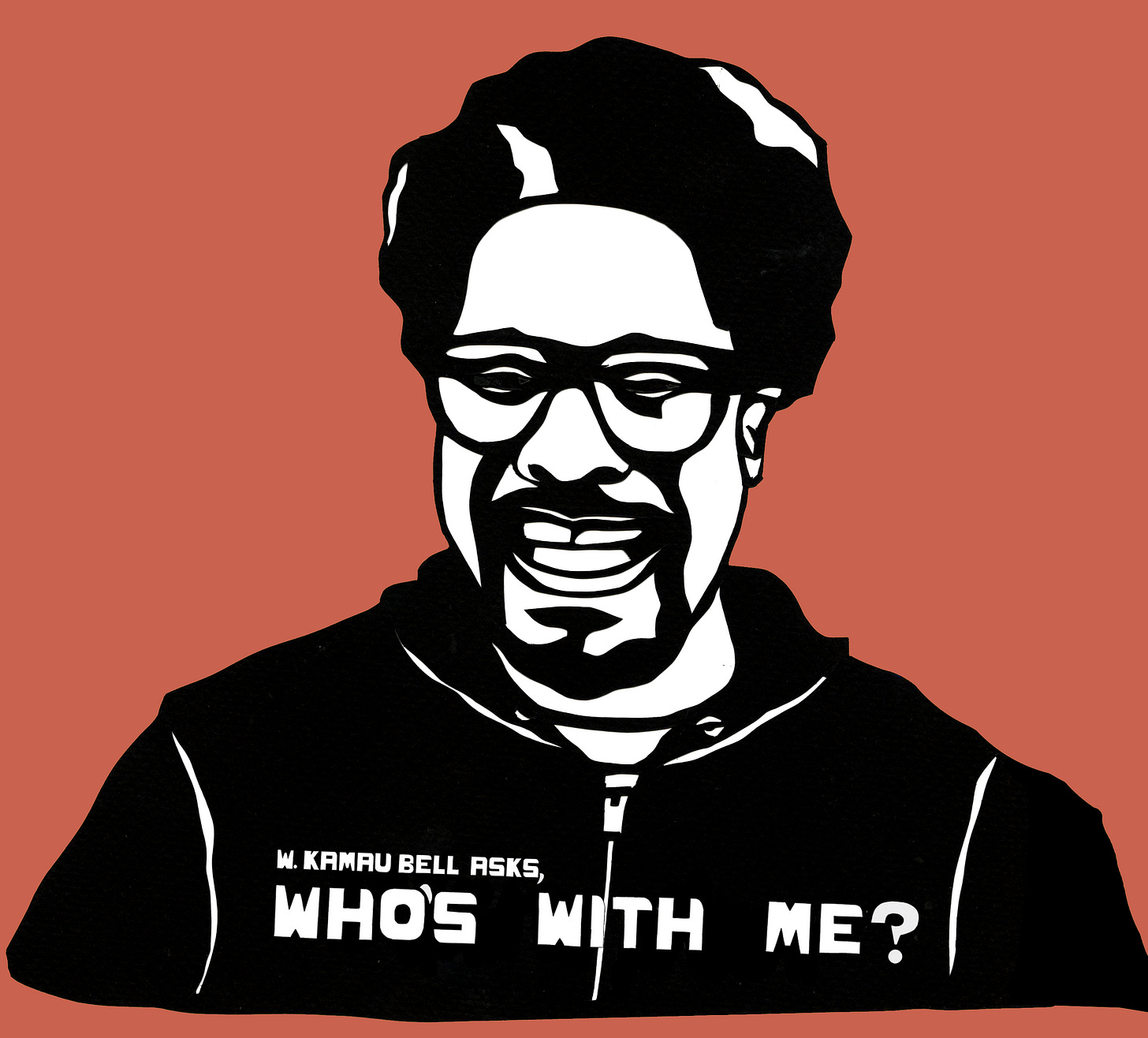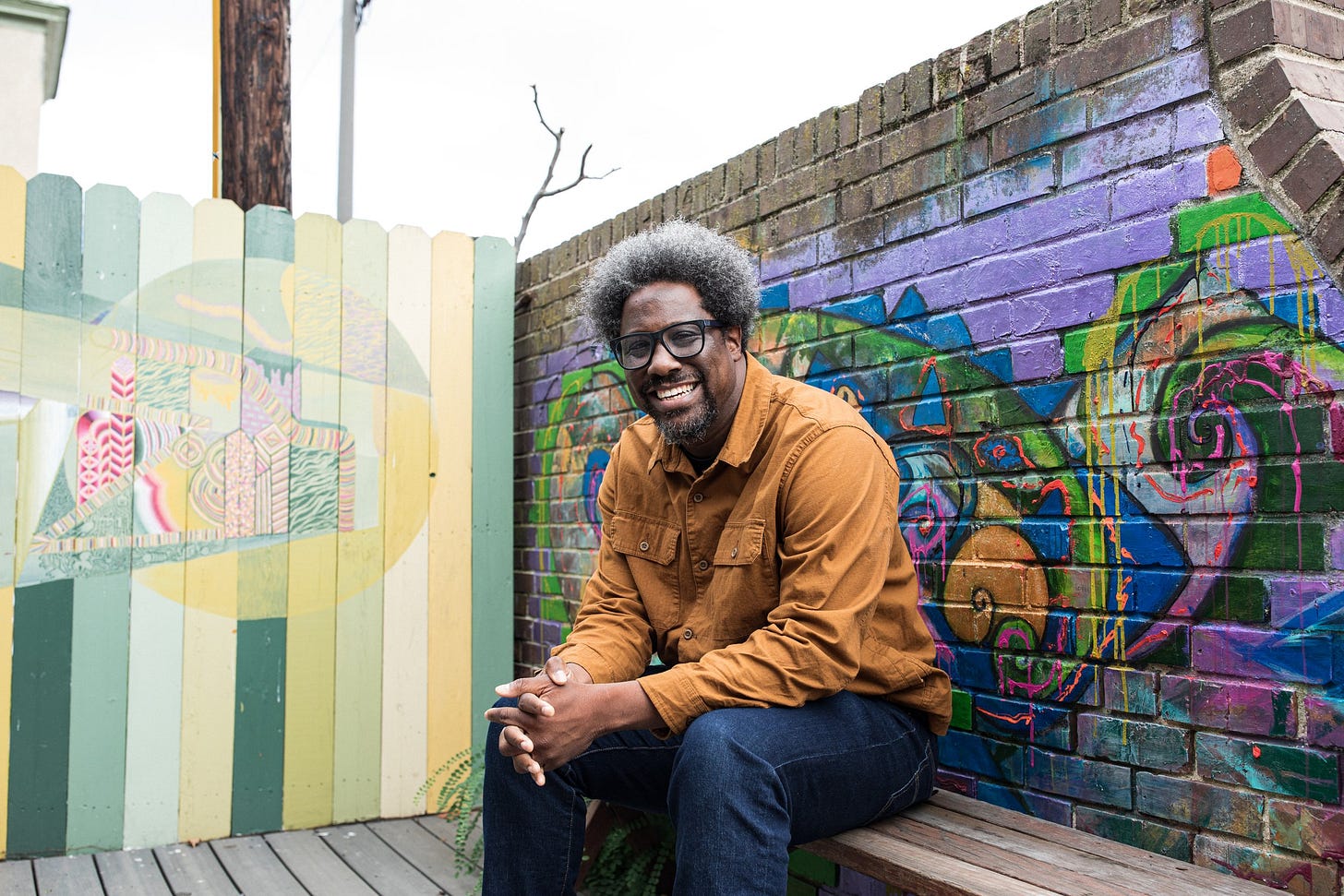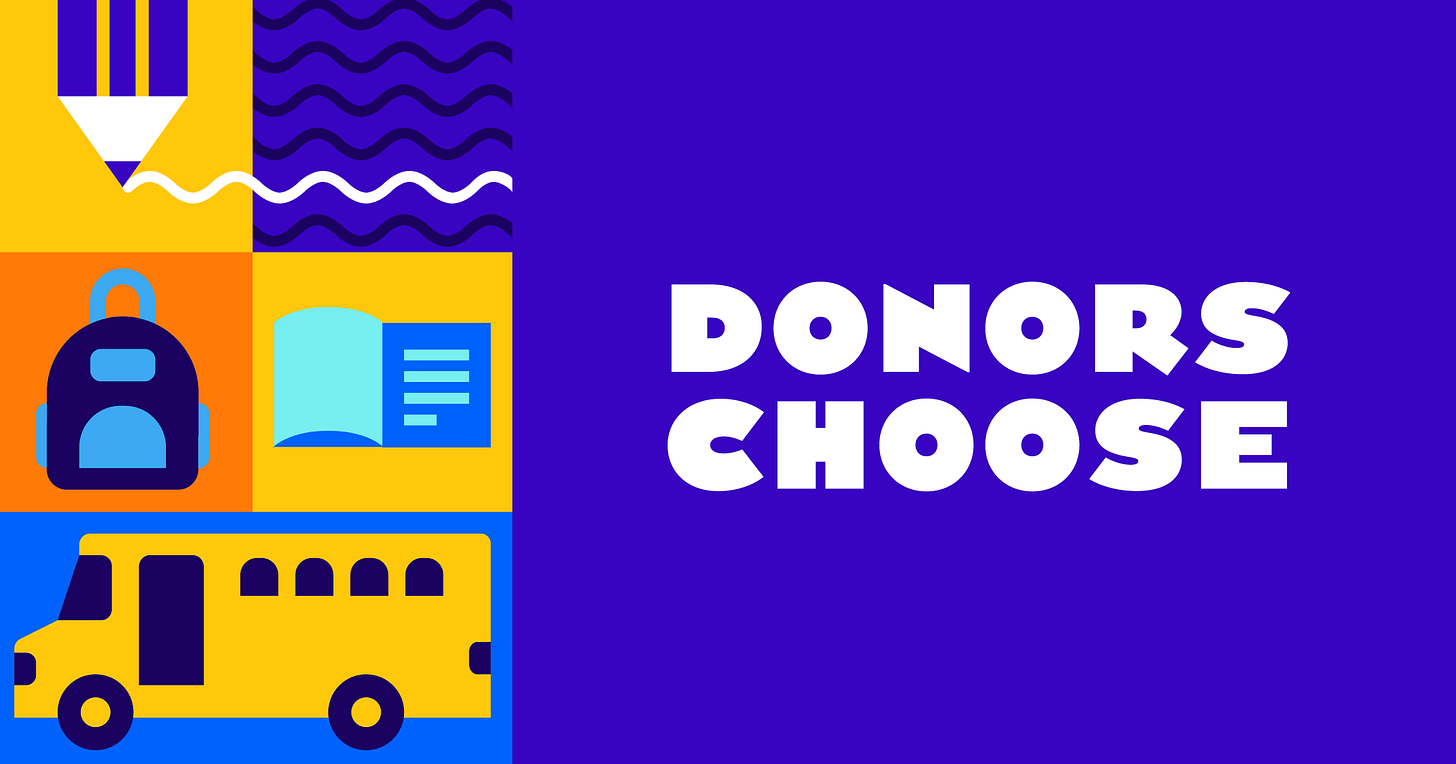W. Kamau Bell Asks: Are You With Me?
The Emmy-award winning comedian talks about parenting, education, and his latest projects
Hi Readers - I’ve been a fan of W. Kamau Bell ever since a co-worker took me to see him at a small club in San Francisco’s Mission District more than a decade ago. I’ve followed his career as he moved into TV with shows like Totally Biased and United Shades of America. In addition to sharing laughs, I’ve learned a lot from his work, and I’ve taken my kids, my partner and my parents to his live events. I always appreciate how he incorporates humor even when discussing serious topics, and how much he values human connection across difference.
I’m so glad to be able to share this interview with you - I hope you enjoy it! — Christopher

W. Kamau Bell Has A Lot Going On
When you meet people who haven't seen your work before, how do you describe what you do?
That’s a funny question, because the answer can go in so many different directions. Often it depends on the context in which I meet them. For years I could just say, “I have a show on CNN.” And that was enough to either get people to stop asking or at least I knew the direction the conversation would go. But now I don’t have a show on CNN, so generally I would say something like, “I work in TV” and then I let the chips fall where they may, because I can at least prove that easily. They can just Google that. I find if I say, “I’m a comedian” that can lead to people wanting me to prove it live and on the spot. No, thank you.
Are any projects you've been involved with you especially like to share with parents and educators?
Depending on the age of your students or children, every episode of my CNN show “United Shades of America” takes a very 101 approach to big, seemingly complex American issues. There is sometimes some adult language. And certainly the topics can be intense (police brutality, transphobia, undocumented folks), but I have heard from many parents who watch it with their kids who are as young as mine (12, 9, and 5). When my oldest kid turned 10 she said she was ready to watch it. We had some incredible discussions during the commercial breaks. I really loved it. But none of my kids have seen the KKK episode. It is different when the thing on TV is happening to your dad.
We made “1000% Me: Growing Up Mixed” with families in mind. There are definitely some unflinching conversations, but they are led by kids as young as 7 years old. And although my book that I co-wrote with Kate Schatz, “Do The Work: An Antiracist Activity Book” was written for grown ups, you could easily pull activities out of it for kids of all ages.
What's something you love about doing this kind of work?
I love working on lots of different things at once. It is how my mind works best. I love the fact I can see the particular value of each medium and that so much of it is collaborative. And I feel extremely lucky that over the course of my career that I have found people who both believe in my vision for various projects and who want to help me strengthen my vision.
I love the fact that even though the subjects can be challenging, we always find ways to bring humor to them.

What's your new newsletter W. Kamau Bell asks, "Who's With Me?" all about? What are you hoping to do with it? Why should people subscribe?
My newsletter is a way to challenge myself to write every week about something I care about and that I most likely wouldn’t write about without this newsletter. So far I’ve written about George Carlin and A.I. and Tracy Chapman’s performance at The Grammys. These are subjects that I have a lot of thoughts on, but I wouldn’t necessarily write those thoughts down.
I also love having a more direct connection to my audience and supporters. It takes so long to make television. But writing can be quicker. I wrote the Tracy Chapman piece in less than 24 hours. Also, if you comment on my Substack I am more likely to respond to you than I am on social media.
I understand you and Kate Schatz are working on a version of "Do the Work!: An Antiracist Activity Book" for young readers. How did you decide to take this on? How will it be different from the original book? When do you think it will be out in the world?
Everywhere we went when we were promoting the first book, people would ask about if there would be one for kids. It will be basically a completely different book. The adult book is based on motivating / shaming adults to get in the fight to end racism. The kids book will be more about sharing the history, facts, figures, and inspirational stories that will hopefully make kids more curious about America. It is meant to give them information in a fun way that is often presented in a dry or intimidating way. We are hoping it arrives sometime in 2025. HEY! THAT RHYMED!
What are some things you learned while making and promoting your Emmy-award winning film "1000% Me: Growing Up Mixed"? Who do you hope sees the movie? What kind of feedback have you had from viewers?
As with most of my projects there are people who absolutely love it and people who aren’t big fans of it. And that is okay. It is only an hour long and is aimed at kids and families so the approach is not for everybody, but it has really landed with families and mixed folks of all ages. I was also pleased because it is the first project that my company made ourselves.
One of the best things about it is that it is on United Airlines flights, so I have heard from many people who have seen it on a plane. That is so cool to me. People have talked about crying on their flights while they watch it. I am also most happy that my daughters, who were involved in the film, still feel proud of it. And also the community of kids and families that we assembled for the film are still in contact with each other. We had an Emmy celebration at our house.
What can you tell us about "What Would You Do?"
I have been a fan of the show for years. I was shocked to get the offer to be on it. We filmed most of my segments in Mobile, Alabama, which is where my dad lives, so I was able to have dinner with him every night. The crew was amazing. I really hope I am invited back on to do more.
I appreciate that you regularly try to help teachers by sharing their Donors Choose lists and helping them find what they need for their classrooms. Why is it important to you to be such a strong ally of teachers?
In addition to having been taught by some incredible teachers, I have always had a lot of teachers in my social circle. I have seen up close how most teachers regularly reach into their own paycheck to make sure their students have everything that they need. And I have seen that they don’t just do it for fun things like donuts. They do it for necessities, like hygiene products and books.
When I first discovered Donors Choose as a user of the site, I was also really happy to find a way to help people directly in the middle of a world where it sometimes feels impossible to do anything to make the world a better place. And it also became a way for me to motivate my audience to do some good. It became an engine of hope, at a time when we need it most.
Also, even if you don’t have kids, you should support teachers in some way, because all those kids will one day grow up to be adults. And believe me, you would rather they had something closer to the best school experience than something closer to the worst one.
Your friend and frequent collaborator Hari Kondabolu recently served as host for a series of mental health videos for youth. Have you done anything similar?
During COVID, I volunteered to host videos about the vaccines. They were designed to help people have good information when the time came to get vaccinated. I heard that the videos actually were shown to people in hospitals and that some people decided to get vaccinated based on the videos. Amazing. I had no idea that this would be my life when I started my career.
And I am an ACLU Artist Ambassador for Racial Justice. I have made two commercials for them. They air so often that some people only know me from those commercials. I also did a video supporting reproductive rights that was aimed at encouraging dads to get in the fight.
What’s a topic or a message you wish young people learned more about in school?
I wish we had some real clear and deep dives about civics and how the government actually works (or is supposed to work). Like, what does a mayor really do? What is a comptroller? What are the responsibilities of a congressperson or a senator? How much power does a president have? How much should they have? SO many of our problems now stem from people not actually understanding the jobs and how they work. I include myself in that. Also, I would love it if this included a history of policing in America and how they came out of “slave patrols” in the south.
As a father to three girls, where do you turn for guidance and advice? Do you have any books, podcasts, or resources you recommend or wish more people knew about?
So many things… Alphablocks, Dr. Binocs, Doc McStuffins, Daniel Tiger’s Neighborhood, Wild Kratts, Bob Books… Most kids books about racism or Black history are great leaping off points for conversation. Don’t expect the book to do all the work. Youtube is a very valuable resource for helping your kids with homework. They don’t do math the way I did math, so I YouTube the math they are doing and then I can help them. I taught my daughter how to ride her bike in five minutes, based on a YouTube video that said it would teach my kid how to ride a bike in five minutes.

At some of your shows in the past, you would run a "bring a friend of a different race and get in 2 for 1!" ticket special. Why was this important to you? Do you think this idea could be adapted to events (like educational conferences) that have struggled to diversity their attendance?
It was important to me because I was performing in theaters and the audience for theaters tends to be of a majority single race depending on the production. I was determined to try to get interracial audiences. It absolutely helped. I sorta of wish I was still doing that. I would recommend it to anybody. The truth was that if people said they were two different races we would just trust them. But it definitely made a visible difference to me when I looked out from the stage. And it got the conversation started before the show would even start. And the shows were usually great, which was all I really wanted.
Also, I wanted racism to end. We have to figure out a way to get all the stakeholders in the room together if we are having conversations about systemic problems and if we truly want systemic changes.
How can people learn more about or follow your work?
Join me on Substack. I’m still on Instagram regularly at @wkamaubell. I’m on the other platforms (Facebook, Twitter, Threads) but less often.
If you enjoyed this post, please forward it to someone else who might like it, and click the ❤️ or 🔁 button on this post so more people can discover it on Substack. 🙏🏼





